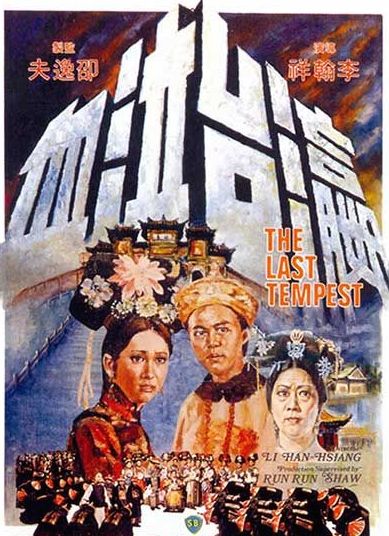Tuesday, March 30, 1976
THE LAST TEMPEST (Ying tai qi xue). Music by Yung-yu Chen, Joseph Koo and Ta Chiang Wu. Written and directed by Li Han-hsiang. Running time: 118 minutes. Mature entertainment in Mandarin with English subtitles
SUCCESS, EVEN A SUCCESS of epic proportions, has done nothing to slow the pace of production at the Shaw Brothers Studios. In March, 1975, the Hong Kong-based film company premiered its biggest-ever feature, a multi-million dollar effort called The Empress Dowager.
For Vancouver audiences, the time lapse has been even briefer. The first film, an historic spectacle, played here in December. Its follow-up, director Li Han-hsiang's The Last Tempest, opens tonight. [March, 1976]
The basic characters and conflicts carry through from the first film, as do the performers in the key roles. The setting remains the court of the young Emperor Kuang Hsu (Ti Lung) and his domineering mother Tz’u Hsi, the Empress Dowager (Lisa Lu).
Some time has passed since the events of the first film, and the current one reflects a subtle shift in director Li's tone.
The time is I898. Kuang has forgotten the personal humiliation he suffered four years earlier, when his politically adept mother managed to consolidate her own power and crush her son’s awkward reform movement.
He has forgotten that the real power still resides with the retired Tz’u Hsi, and that he is expected to handle the day-to-day details of the administration, and to behave himself.
Kuang, for all of his good intentions, is caught between historic forces. He chooses as role models a pair of modernizing monarchs, Russia's Czar Peter and Japan's Emperor Meiji. His preferred advisors are a pair of young reformers, Kang Yu-wei (Ling Yun) and Tan Szu-tung (Yueh Hua).
He is fascinated by Western technology. Complicating the picture still further are his romantic preferences.
Kuang displeases his tradition-bound mother by living apart from his weepy wife, the Empress Chin Feng (Ivy Ling Po). He is too open in his genuine affection for one of his assigned concubines, Mistress Chen (Hsiao Yao),
If cross-cultural comparisons are needed, writer-director Li Han-hsiang qualifies as the Chinese film industry’s version of David Lean. The Englishman got his start directing the screen versions of some saucy Noel Coward comedies, later moving on to produce such ponderous cinematic items as 1965's Doctor Zhivago and Lawrence of Arabia (1962).
Li, under contract to the Shaw Brothers, once specialized in sex comedies. His own interests, however, run to the historic, and his major chance came with last year’s The Empress Dowager.
Like Lean, Li is a stickler for historic accuracy in his settings. Like Lean, he also has a weakness for emphasizing the love-story aspects of his epics.
The Last Tempest opens with Kuang’s famous "100 Days of Reform." Encouraged by his closest advisors, he cheerfully signs decrees that fly in the face of centuries of tradition, uproot the privileged and, incidentally, create bitter enemies for him and his program. Outraged, the elder mandarins lobby his mother to take him in hand.
Neither Emperor nor Empress Dowager wants a confrontation. While his advisors argue policy, Kuang shows signs of increasing instability. Rather distractedly, he gives the tough-minded Tan the go-ahead to do whatever is necessary and, in his enthusiasm, Tan makes a fatal miscalculation.
Part of the technological revolution has been an upgrading of those units of the Chinese army under the chameleon-like General Yuan Hsi-kai (Huang Hsin). Thinking him partial to the reformers, Tan recruits him and his troops to provide the muscle for a coup.
In a lightning-filled scene worthy of a Shakespearean tragedy, Tan presents his plan to Yuan, and promises that he, Tan, will see to the death of the Dowager.
It never comes to that. Yuan double-crosses the young revolutionaries. (Historically, Yuan managed to survive the dynasty to become, in 1912, the first president of the the Chinese republic.) The crisis passes.
Before it does, though, Li shifts the mood of the piece. Kuang, a man on the edge of insanity, rather than his reform movement, becomes the centre of attention, When the Emperor is packed off to a fortress prison, the film becomes a tragic romance, complete with a pop ballad on the soundtrack.
Such stylistic backsliding is a surprise. The foment going on in China (and the world) in this period is artfully symbolized through much of the movie.
Li begins by reflecting momentous events through the closed world of the Chinese court. He ends by turning his epic into a soap opera squabble that is little more than a family dispute. From a strong start, The Last Tempest becomes just another tale of star-crossed, lovers.
The above is a restored version of a Province review by Michael Walsh originally published in 1977. For additional information on this archived material, please visit my FAQ.
Afterword: That was then. Forty years ago, Chinese cinema — which included rather more pictures from Britain’s Crown colony Hong Kong and U.S. protectorate Taiwan than the People’s Republic — was best known for martial arts adventures and period dramas. As I noted in a 1974 news feature,
Now, there is The Wandering Earth. A $48-million science-fiction feature based on a short story by Hugo Award-winning author Liu Cixin, it opens today (February 5) around the world. Directed by Frant Gwo (who was born in 1980, four years after the release of The Last Tempest), it is China’s challenge to Hollywood’s hegemony in the area of special-effects-driven popcorn movies. (According to the Xinhaunet
The story involves an attempt to avoid a planetary catastrophe and takes as a given that in the future, China is a space-faring power. In the real world, of course, the People’s Republic has had a manned space program since 1967. Current plans include the launching of a permanent Chinese space station sometime in 2020 in anticipation of missions to the moon and Mars.
